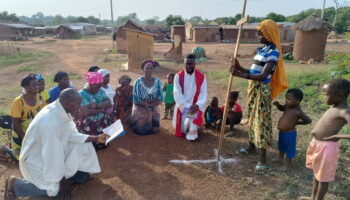
The Consolata Lay Missionaries (LMC) of Portugal gathered on Sunday, July 21st to celebrate their 25th anniversary of life and mission. The celebration took place during the national assembly, 20-21 July, at the headquarters of the Consolata Missionaries in Lisbon (Olivais).
The event was attended by around 25 people from the north of the country, from the Lisbon region and also from Ireland, where a LMC couple emigrated.
A little history
The first group of Consolata Lay Missionaries was established in 1999, the result of a journey of reflection, training and accompaniment by the Cacém Consolata Missionaries, in particular by Father Paulino Ferreira.

The desire to experience the mission ad gentes firsthand, to be with the poorest, to “be present” and to be a presence of Consolation, led the first lay couple, Ricardo and Elizabeth, to leave for the mission in the year 2000, more precisely for Mapinhane in Mozambique where they worked in pastoral care and education at the Father Gerardo Gumiero School founded in 1996 by the Consolata Missionaries and the Augustinian Missionary Sisters.
The Consolata Lay Missionaries community members come from different parts of the country. They are present not only in Cacém, but also in Águas Santas (in the north), where Father José Matias and many other Consolata missionaries worked and gave their testimony to the mission. It was this desire of Consolation that pushed the second lay couple, Teresa Silva and Paulo Rocha, to leave for the mission in the year 2002, and go to Tanzania, where they worked in pastoral care, and in an orphanage; eventually they returned to Portugal in the year 2005.
Mission is sharing, it is testimony, it is the desire to be present. It cannot be otherwise. As Blessed Joseph Allamano would say: “God calls me today… I don’t know if he will call me tomorrow”. So, in this very spirit, in the year 2004, another couple of lay missionaries from our community of Cacém – Tina and Filipe – left for Mozambique to continue the presence of lay missionaries there. The community of lay missionaries remains alive, trying to live up to the Charism of Blessed Joseph Allamano in their daily life, responding to the missionary call. New members are joining the community to live this lifestyle choice – the mission as lay missionaries – and the community keeps growing.
As the missionaries come and go, the mission is renewed. While some return, others leave for the mission. In the year 2008, another couple left for Mozambique, Rui and Diana, to work in the Catechetical Center in the land of the Martyrs of Guiúa, in the diocese of Inhambane. There they dedicated themselves to the pastoral care of young people, children, and health and education programs. Later, Carina, another lay missionary, joined them.
But the mission is also present here in Portugal, where the LMC family is growing with more vocations, the result of missionary animation among young people and volunteers. And the work continues: sending volunteers, doing missionary animation, sustaining educational projects such as “Estuda Lá”, and human promotion projects such as the sewing program of “ArteGentes”, which are all forms of mission carried out by the LMC of Portugal.

“It’s not enough to start a job well, you have to persevere to reap its fruits.”
The Consolata Lay Missionaries are this good fruits, because their testimony shows us that the mission is where God wants it to be.
Wherever a member of the LMC is found, whether inside or outside, the Ad Gentes Association, the neighborhood of Zambujal (the outskirts of Lisbon), the parish of São Marcos, in Lourel, Linhó, or in the communities, what matters is the desire to live the “Consolation” as a source of life.
As Allamano used to say to his missionaries: “Our Institute belongs to God from the very beginning; it belongs to Him, just as a field belongs to its owner. Our Lady founded it, but it all started from God.”
So, many are the reasons to congratulate and be grateful to God for this 25th anniversary of LMC’s missionary life.
* The Consolata Lay Missionaries of Portugal.



